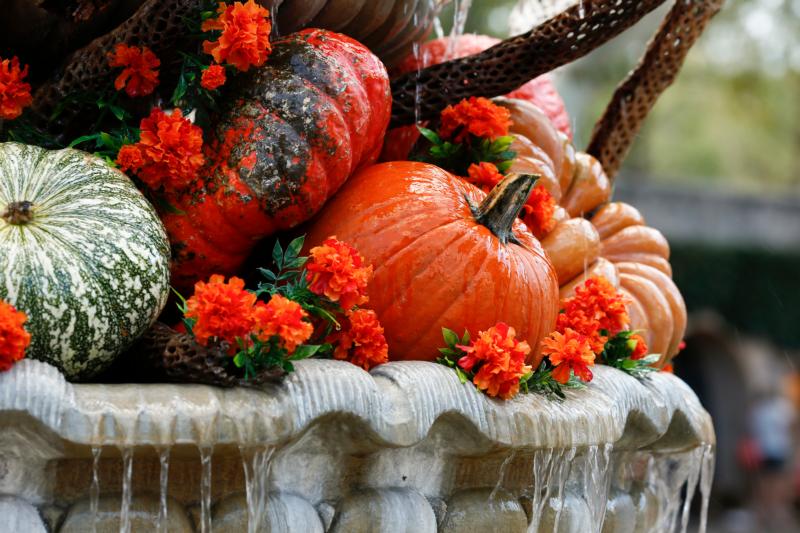
A bounty of fall pumpkins and flowers are displayed at the Tlaquepaque Arts and Crafts Village in Sedona, Ariz. Thanksgiving Day is Nov. 28 this year. (CNS photo/Nancy Wiechec)
This time a year ago, less than 20 miles from where I live in Southern California, a dozen people were killed and a dozen more injured in a horrific mass shooting at the Borderline Bar and Grill, less than a half-hour from our home.
That same week, in the same general area (east Ventura and west Los Angeles counties), thousands of homes were besieged and hundreds destroyed by brush fires.
And that was less than a year after wildfires had come to within a few blocks of our historic parish church where my family works and worships. Before it was extinguished, the “Thomas Fire” ravaged 440 square miles, destroyed more than 1,000 structures and killed two — just a month before heavy rains tore through hillsides, destroyed 130 homes and killed 21 people.
[hotblock]
We in Southern California, of course, are hardly alone in coping with natural disasters, mass shootings and all manner of destructive events that make us take pause when we hear the words of Psalm 118: “Give thanks to the Lord, for he is good, his mercy endures forever.”
Because while those of us who are believers in the word of God can accept that the Lord is good and merciful, there are times — even entire years, like 2019 — when we can easily wonder, for what can we give thanks?
For fires, floods, hurricanes and earthquakes that ravage lives and homes?
For oppressive regimes that persecute, imprison and kill the most defenseless in their societies?
For acts of violence — like mass shootings in public places — that kill and injure innocent people?
For world leaders and domestic politicians who stress the “dis” in discourse?
For corporate and organizational leadership teams who value profitability ahead of human dignity?
For the less reported but very real challenges, stresses and obstacles of everyday life — related to family, health, employment — faced by people everywhere, believers and nonbelievers alike?
[tower]
Perhaps it is providential that we are in a season that calls and reminds us to consider that the world is all about heartache and hassle.
Maybe we need to study and reflect on the readings for Thanksgiving Day, Nov. 28:
— Sir 50:22: “Bless the God of all, who has done wondrous things on earth.”
— Ps 145:8-9: “The Lord is gracious and merciful, slow to anger and of great kindness. The Lord is good to all and compassionate toward all his works.”
— 1 Cor 1:4: “I give thanks to my God always on your account for the grace of God bestowed on you in Christ Jesus.”
— 1 Thes 5:18: “In all circumstances, give thanks, for this is the will of God for you in Christ Jesus.”
And finally, the Gospel, from St. Luke, in which one leper out of 10 cured by Jesus returned to give thanks to God. “Stand up and go,” Jesus told him. “Your faith has saved you” (Lk 17: 19).
“Your faith has saved you.” And where does faith come from?
In my experience, faith starts with humility — not the “I’m just an ordinary guy, no better than anyone else” humility (though there is much truth in that), but the recognition and acceptance that my ways and my thinking are no match for God’s, that I don’t have all the answers (if anything, I have darn few), that life is not all about me.
Humility leads to respect for God’s creation, human and otherwise (those “wondrous things on earth,” says Sirach) and respect leads to appreciation — hopefully, a renewed appreciation for all that God has provided throughout our lives.
[hotblock2]
For me that means appreciating the gift of a loving family, good friends, a welcoming parish community and the opportunity to serve all of them.
Ah, service. How often have I (and maybe you) found comfort and joy in doing for others?
It doesn’t have to be huge: Even holding a door open for someone can bring a grateful smile that may be the first and only smile you receive that day, but I find that one smile, that one light, carries me through a lot of darkness.
Appreciation also means recognizing the gifts of others, especially the gifts that I don’t have. And that opens us to the capacity for love — or, more accurately, to love one another more deeply. Knowing that my wife and son love me, and that I love them, gives me strength to endure all of life’s challenges.
And love? That should lead us to trust, especially trust in God, but also trust in those whom we love and who love us, that they are going to carry us through difficult times, just as we are called to do for them.
Again, Psalm 145 comes to mind: “The Lord is good to all and compassionate toward all his works.” In the face of grief and sorrow, we are called not just to remember but to trust those comforting words — and offer thanks and praise not only for all we are given, but for all we can give.
***
Catholic journalist Mike Nelson writes from Southern California.
PREVIOUS: Culinary prayer praises God’s abundant gifts
NEXT: Want to add to hope, joy, reflection, healing? You can do Advent


Share this story